
|
Astronomy Picture Of the Day (APOD)
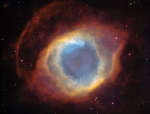 The Helix Nebula from Blanco and Hubble
The Helix Nebula from Blanco and Hubble
12.10.2014
How did a star create the Helix nebula? The shapes of planetary nebula like the Helix are important because they likely hold clues to how stars like the Sun end their lives. Observations...
 Eclipse at Moonrise
Eclipse at Moonrise
11.10.2014
As the Moon rose and the Sun set on October 8, a lunar eclipse was in progress seen from Chongqing, China. Trailing through this composite time exposure, the rising Moon began as a dark reddened disk in total eclipse near the eastern horizon.
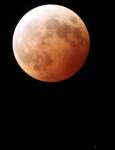 Moons at Opposition
Moons at Opposition
10.10.2014
From the early hours of October 8, over the Santa Cruz Mountains near Los Gatos, California, the totally eclipsed Moon shows a range of color across this well-exposed telescopic view of the lunar eclipse.
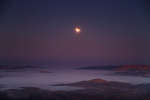 Eclipse at Moonset
Eclipse at Moonset
9.10.2014
The Pacific Ocean and Chilean coast lie below this sea of clouds. Seen through the subtle colors of the predawn sky a lunar eclipse is in progress above, the partially eclipsed Moon growing dark.
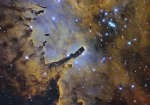 NGC 6823: Cloud Sculpting Star Cluster
NGC 6823: Cloud Sculpting Star Cluster
8.10.2014
Star cluster NGC 6823 is slowly turning gas clouds into stars. The center of the open cluster, visible on the upper right, formed only about two million years ago and is dominated in brightness by a host of bright young blue stars.
 From the Temple of the Sun to the Temple of the Moon
From the Temple of the Sun to the Temple of the Moon
7.10.2014
What connects the Sun to the Moon? Many answers have been given throughout history, but in the case of today's featured image, it appears to be the plane of our Milky Way Galaxy.
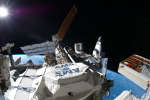 Space Station Detector Finds Unexplained Positron Excess
Space Station Detector Finds Unexplained Positron Excess
6.10.2014
Where did all these high energy positrons come from? The Alpha Magnetic Spectrometer (AMS-02) onboard the International Space Station (ISS) has been meticulously recording how often it is struck by both high energy electrons and positrons since 2011.
 A Total Lunar Eclipse Over Tajikistan
A Total Lunar Eclipse Over Tajikistan
5.10.2014
If the full Moon suddenly faded, what would you see? The answer during the total lunar eclipse of 2011 June was recorded in a dramatic time lapse video from Tajikistan. During a total lunar eclipse, the Earth moves between the Moon and the Sun, causing the moon to fade dramatically.
 Mars, Antares, Moon, and Saturn
Mars, Antares, Moon, and Saturn
4.10.2014
Mars, Antares, Moon, and Saturn are the brightest celestial beacons in this serene sky. The Sun's golden light is still scattered along the southwestern horizon though, captured after sunset on September 28.
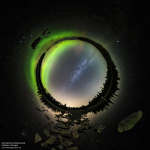 Aurora and Milky Way in a Little Sky
Aurora and Milky Way in a Little Sky
3.10.2014
Stepping stones seem to lead to the Milky Way as it stretches across this little sky. Of course, the scene is really the northern hemisphere's autumnal equinox night. Water and sky are inverted...
|
January February March April May June July August September October November December |
|||||||||||||||||||||||||||||||||||||||||||||||||